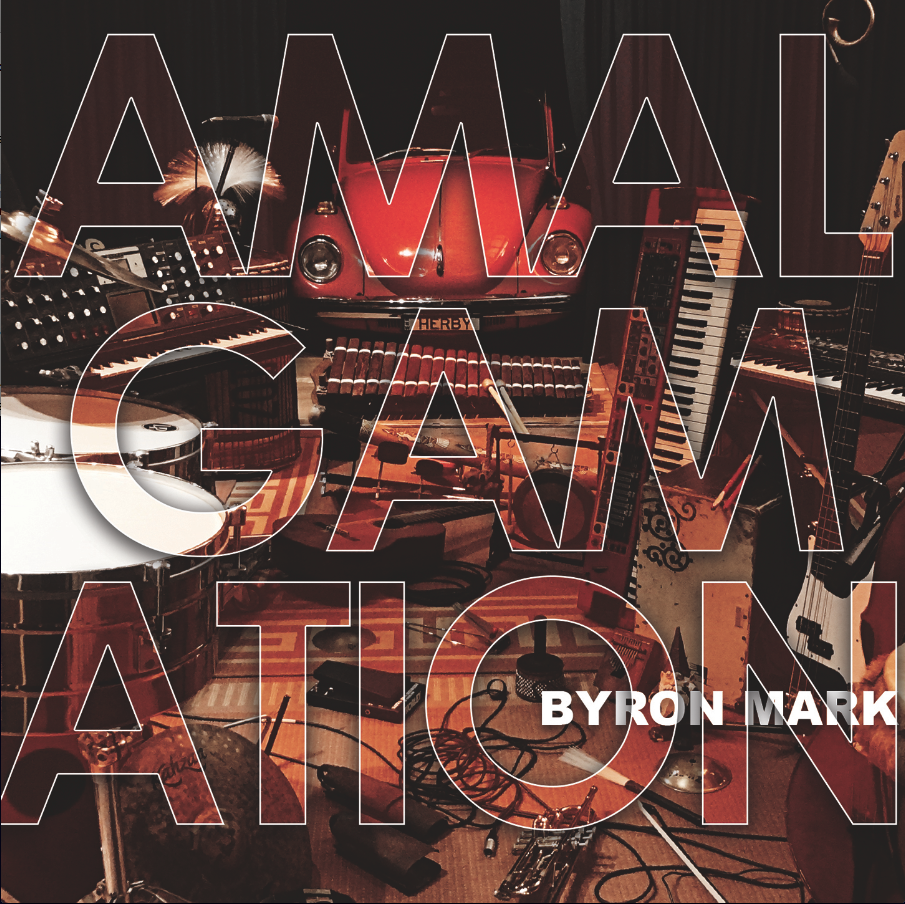
ALBUM REVIEW
I am stoked to present to you a beautiful album review done by the one and only Brad from ‘SKYE ON STAGE’.
I am truly greatful for all your efforts on this review Brad!
Check out the review below, or click here to read it on facebook 🙂
SYKE OFF STAGE REVIEW: AMALGAMATION (THE ALBUM); BYRON MARK; BUG SONIC RECORDS.
Percussionist Byron Mark has a new solo album to his name, his debut, many years in the making (over a decade in the writing, alone), entitled Amalgamation; a reference, no doubt, to its eclecticism. (He describes it as degustation, a melting pot and both are very apt.) When I say eclecticism, I’m not talking about a capricious grab bag of genres. There’s a pronounced musicality, for example, in the confluence of the opening cut, Fuego Nocturno (which won’t be lost on anyone familiar with Mark’s live sets), which melds tribal rhythms, flamenco, jazz and what used to be called progressive rock, to sparkling effect. It’s an impeccably-produced track that jumps out of the speakers. Impassioned cajon, splashes of cymbals, rollicking piano, acoustic guitar & raunchy bass really hit it off in this all-too-brief instrumental opus, which has the air of the epic about it. It’s a bristling, exciting, visceral entry to a fresh, shiny, fabulous set.
There’s confluence, too, in his collaborations with colleagues. A solo album of this sort relies on the term solo being used advisedly, since, as I’m sure Byron would be the first to attest, it becomes hard to know precisely where the designated composer’s contribution begins and ends, relative to others playing on the track. Fuego Nocturno is a prime example, having its roots in a succession of on-stage jams with guitarist Luke Koteras, whose guitar stylings feature so prominently and pivotally, backed by Eric Fortaleza’s entirely sympathetic and supportive bass. These two are soulmates, right in the pocket, alongside Mark’s scintillating pianism and percussive punch.
B.D.E. is funkier; a little sultry, with its fuzzy bass & complementary spaceage synth sounds, big, resonant, kickarse kit sounds (not to mention virtuosic drumming, especially on toms & timbales), edgy jazz-rock electric guitar break & clunking cowbell, tinkling electric piano and sweet vocals, from Sheena Wilbow, which, indeed, have a lustrous sheen to them. Phil Collins meets Stevie Wonder, with a little vintage Prince stardust too. All-in-all, you might say it’s old school and t’ain’t noth’n’ wrong with it. At the same time, it’s got an easy, Sunday arvo feel. A no-cost bonus is a bunch of especially tasty licks from Banel Martinez on electric guitar. Mark shows he has as much facility on synth as piano and that’s really something. His imagination, manifest in melodic interpolations and textural interludes, would seem to know no earthly bounds.
The title track opens with an inscrutable piano intro, alluding, almost at once, to classical (astoundingly, Spotify cites Frederic Chopin as a related artist) and honky-tonk, but settling into a jazz ballad vibe. At just over a minute in length, its proves a tease: all over before you know it and just when it was getting interesting. The shape of things to come?
Lion Heart capitalises on the mooted jazz ballad mood, though with due deference to blue-eyed soul. If that isn’t Rosie Henshaw’s free-floating, pitch-perfect voice out front, I’ll be damned; there’s nothing quite like it. The lyrics are hers, too, characteristically infused with positive vibrations. And we get two Martinez bros: Banel, again, distinguishing himself (perhaps as never before) on guitar, and Dauno, on worldclass bass. You’d think you were listening to a full family band, such is the simpatico. Musically, I’m hearing, say, shades of the laid-back, yet on-it cool of Airto, harmonic intrigue of George Benson, or the foreplay of Larry Carlton. But don’t quote me, for you’re bound to find your own reference-points and markers, based on individual listening experience. The point is, it swings and seduces with its innate sophistication and class, even while hypnotising with its essential ethos, to open your heart—and mind—to ‘the shining light’.
Duchalezaron is coded nomenclature, a collective—yes, amalgamated—signature for the three key contributors to the next track, an largely improvised, unapologetic, straightforward funk groove that needs little more introduction, or qualification: it speaks for itself, in the eloquent way only music can.
Wontonara, for mine, further justifies my recollection of the likes of Airto. Or you might think of it as latter-day Sergio Mendes, eat your heart out. But it’s African and Latin leanings are subverted, revolutionised and turned on their head by the inspired interpolation of didj, courtesy Byron’s brother, Nick. If you happen to speak Susu, you’ll know he title means ‘come together’. It’s visceral; tribal; sexualised; even, a little belligerent, commanding, ‘you must dance’. I defy your resolve to resist, as does the track.
For an ever-so-brief moment, I though my apprehension of the album had been interrupted by Michael Buble, or Maroon 5, as First date sprang to life. Certainly, if either released it, they’d have a smash worldwide hit on their hands. it’s a bouncing, irrepressibly catchy, sunny, ten-tenths pop song, faithfully embodying the first flush of love. Its lyrics, co-penned by Mark & Koteras, have just about all the fair weather metaphors you can poke a stick at. ‘I know i sounds kinda stupid, my heart’s been struck by Cupid’ is mindless, but who isn’t mindless when inundated with endorphins? Who hasn’t felt like that? And who doesn’t want to again?
Byron Mark is full of surprises: this album ducks, weaves, winds and wanders across genres in utterly unselfconscious, serpentine fashion. And I’m lovin’ it.
Wakeman & Wonder are channelled in Motion Potion, which also puts me in mind of Mr Ott (alter ego of Matt Ottignon), not least thanks to Mark’s sassy sax. Again, there’s a weirdly dark choral & piano intro, but a sharp synth motif puts paid to that, while Ben Hibbard’s vibes, as well as Ellen Kirkwood’s trumpet & Simon Ferenci’s ‘bone, ensure Mark recalibrate—nay, practically reinvents—our notion of funk, in one fell, sneaky swoop.
With full credit to Marks’ artistic generosity and self-assurance, Shane Barrett was afforded the opportunity to pick up sticks and pound the kit in Happy Africa, which sounds explicitly like its title: an orgiastically polyrhythmic free-for-all that begins with a near recapitulation of Stevie’s intro for Superstition, before zigging & zagging across jazzed, Zappaesque and Afro-Cuban terrain. It’s a track that has terroir, also: a provenance that goes right to uni and Mark’s first-ever band from those days, dlivr, which actually gave birth to an album, with a second on the way, before the rhythm section up and hightailed it overseas. The track we here now is based on, or around, an historical remnant: recordings of drum and djembe made, back in that day, by these brothers in beats. Mark has woven a melodic line & quite some magic around these, to complete what is, for all intents & purposes, a brand new track. Trap drums, djembe, cowbell, whistle, Byron Luiters’ sliding Soweto bassline, David Reaston’s electric guitar, along with Kirkwood & Ferenci’s brass syncopations fuse as one. As a contemporary rearrangement of a recorded relic, Mark has forged a phat-as sound, crowned by a free jazz outro.
Piano Dance puts me immediately in mind of Michael Nyman’s emotionally turbulent soundtrack for Jane Campion’s seminal film. But, as with the candid, unabashed, heart-on-sleeve influences and derivations apparent throughout the album, the homage is reverent and justifiable: Mark seems to be dipping his lid to music and musos he esteems in the highest. And Mark’s outing is bolstered by a rhythmic emphasis not nearly so evident in Nyman’s oeuvre. It tinkles, trills and rollicks along; mellifluous, even while exploring jazz & flamenco motifs. The palmas lend a passionate intensity that wouldn’t be present otherwise. Further listening reveals & rewards, with a stylistic alignment with the opening cut.
Roamin’ Gnome is cool jazz personified; albeit with a percussive punch, again, more readily identified with African, or Latino, modalities. Highlights include the synth break &, of course, Jade Lumbewe’s exceptionally pretty vocal. Lumbewe co-wrote with Mark and it only took nine-odd years to finish the song, originally mooted on cassette. It’s just the thing for a carefree, autumnal, sunny Sunday afternoon, ‘ standing for hours, guarding the flowers’. Pinot grigio optional.
Colour reverts to a pop sensibility; though we’re talking very sophisticated, handsomely-produced pop. I especially favour the bass keyboard fx, even if I might’ve lived without the vocal processing. It’s co-written with Van Sereno (who features on vocals), a longtime collaborator on whose albums Mark has often appeared. There’s an eerily Beatlesque quality about the mellotron, but the fab four were never quite this funky. As attractive as the melody & intriguing as the lyrics are, it’s the rhythm track that really defines & makes this track. The chorus is especially strong and the whole is luxuriously appointed, instrumentally. Sereno’s voice is like a refreshing breeze.
Groove Set In capitalises on this vibe: it’s a shoe-in for high rotation in nightclubs (if it’s not being played already); albeit, again, occupying a place at the pointy end of that spectrum. A collaboration with old friend, Luke Koteras, the groove sets in early and takes hold. Keyboard programming is—characteristically—exceptional, while Koteras’ vocal has a tender, vulnerable quality that’s compelling. Chances are you really will ‘forget your troubles’, thanks to the throbbing tempo & slick-as production. There’s an interpolation of rap and all things likely to seduce the contemporary RnB (for want of a better term) acolyte, Drake devotee, or, even, Fetty Wap follower.
YiaYia is a track of an entirely different colour: whiter; more classically-inclined. The symphonic opening is sublime, thanks in no small measure to a wonderfully sympathetic quartet. The feeling of the piece is poignant and palatable; genuinely, heartfelt, as it was conceived & written in homage to Mark’s own, late YiaYia, for whose loving arms the author clearly yearns. Compositionally, it has the elegant simplicity of so much of the very best in musical expression. Mark’s piano complements the sweet nostalgia evoked by the strings &, while the entire work is only about the length of the archetypal pop song, it comes off as a minor, eminently extendable, epic.
The concluding track, a little ironically, is entitled Just Getting Started. Beginning with a string intro reminiscent of tuning-up, it gradually gives way to dramatic percussion (including piano) and a stunning bass riff, which tends to hark back to our entry-point, Fuego Nocturno, with all its theatrical promise. For anyone enticed and excited by drummers and big beats, it’s nine minutes and more of Phil Collins goes flamenco, with subtly shifting rhythms and a keen sense of improvisational danger.
Byron Mark has brought together a wealth of talent (including his own diverse endowments) to produce an adventurous, unambiguously eclectic album of deep imagination and musicality. There’s a sense of generosity, as well as sincerity, to say nothing of unbridled energy. Mark’s opus exudes a childlike enthusiasm. It’s an album like no other I know and that, in and of itself has to be a good thing, since it intimates originality. Mark has, apparently, taken to heart Oscar Wilde’s sage advice: to thine own self, be true.
